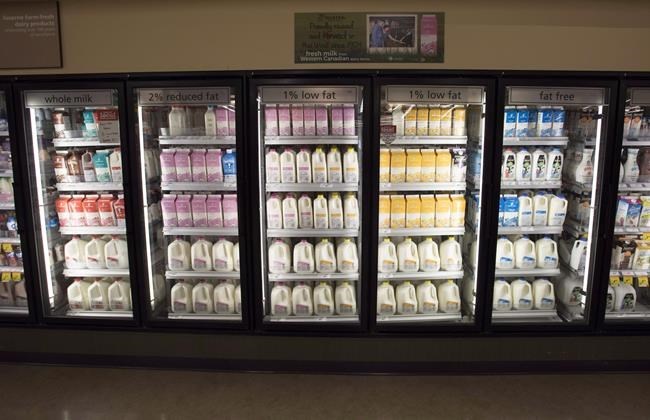Milk and dairy prices are expected to jump next year after the Canadian Dairy Commission recommended an 8.4 per cent increase in farm gate milk prices.
The higher price, which works out to an extra six cents a litre, is intended to help offset rising production costs due to the COVID-19 pandemic, including soaring feed, energy and fertilizer costs, according to the federal Crown corporation.
"We're seeing that the cost of production is really going up quickly and the revenues are not following," Chantal Paul, a spokeswoman for the Canadian Dairy Commission, said in an interview on Monday.
"We felt that there was really a need for a relatively large increase this year to bring more balance between the costs and revenues for dairy farmers."
The price hike is expected to be approved by provincial authorities next month and take effect Feb. 1.
Meanwhile, the commission, which manages the delicate balance between dairy supply and demand in ��ѻ��ý, is also raising the support price for butter used in its storage programs by 12.4 per cent and recognizing a five per cent increase in milk processing costs such as packaging, labour and transportation.
It's unclear how much of the increase will be passed along to consumers.
Milk prices vary across the country, and some grocers use milk as a "loss leader" to attract customers, said Sylvain Charlebois, director of the Agri-Food Analytics Lab at Dalhousie University.
Overall, he said the retail price of milk in grocery stores could increase as much as 10 per cent while prices for dairy products like butter, cheese and yogurt could soar as much as 15 per cent.
"This is definitely a record-setting increase," Charlebois said, adding that the farm gate price hike of 8.4 per cent is nearly double the previous record of 4.52 per cent set in 2017.
The 12.4 per cent increase in the support price for butter used in the commission's storage programs is also significant, he said.
"From 2016 to 2021, the increase for butter was 12 per cent for all five years, just to give you an idea of how big an increase it will be next year," Charlebois said.
Dairy Farmers of ��ѻ��ý president Pierre Lampron said the adjustment in the farm gate milk price will partially offset the higher cost of cattle feed, fuel, machinery, fertilizer and seeds for crops, he said.
"Dairy products are not immune from inflation, however, under supply management, price increases have been more gradual and incremental for dairy products," Lampron said in an emailed statement. "This price adjustment remains below the increases observed for many other foods since the beginning of the pandemic.”
The consumer price index for dairy increased by 7.4 per cent over the last five years, while meat rose 11.8 per cent, eggs 20.6 per cent and fish 7.7 per cent, according to the dairy commission.
Some food prices have risen more dramatically in recent months, with Statistics ��ѻ��ý figures showing meat prices increased 10 per cent in six months amid rising inflation this year.
Mathieu Frigon, president and CEO of the Dairy Processors Association of ��ѻ��ý, said dairy processors’ operating costs have also significantly increased over the past year.
"We certainly were relieved to see that, within the 12.4 per cent increase in butter support price, (the commission) has recognized a five per cent increase in milk processing costs," he said in a statement.
Frigon added that the needs of everyone in the system, from farmers to consumers, must be considered and balanced when making decisions on farm gate pricing.
"These decisions have ripple effects, so it's important that the rationale is shared and understood," he said.
This report by The Canadian Press was first published Nov. 1, 2021.
Brett Bundale, The Canadian Press



